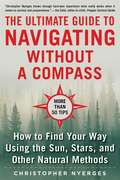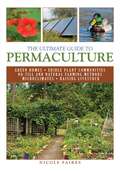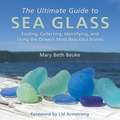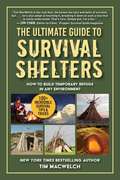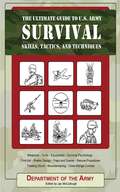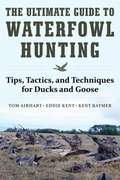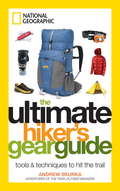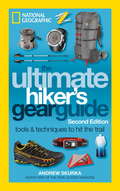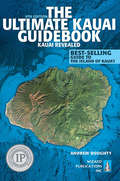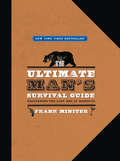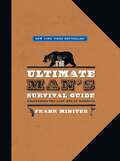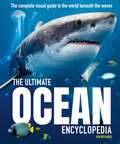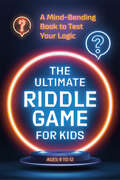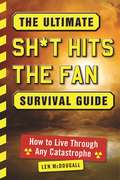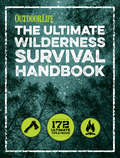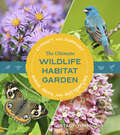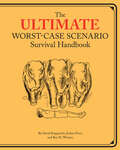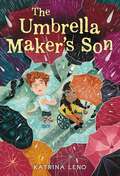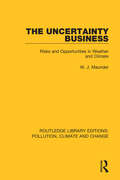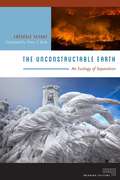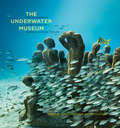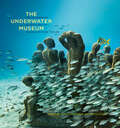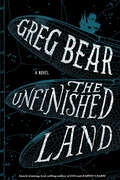- Table View
- List View
The Ultimate Guide to Navigating without a Compass: How to Find Your Way Using the Sun, Stars, and Other Natural Methods
by Christopher NyergesLearn how to navigate without a compass, even when it seems impossible! Whether we are walking or driving, whether in the woods, on the water, or in the city, it’s vital that we know where we are and are able to find our way around. But with society’s current dependence on modern tools and technology, many persons would have no idea how to navigate without a compass or GPS. In an emergency situation, that lack of knowledge could easily prove fatal. In The Ultimate Guide to Navigating without a Compass, survival expert Christopher Nyerges provides readers with all the skills that they may need to navigate naturally. The book begins by describing the meaning of natural navigation, and then moves on to describe, in detail, the methods of natural navigation, including using the sun, the stars, the moon, and shadows. Additional topics include: How to read a map How to make a sun dial How to make a star dial How to use clouds to predict weather patterns How to track celestial changes How to gauge time through natural observation And much more! With helpful diagrams, illustrations, and sidebars, The Ultimate Guide to Navigating without a Compass is the fundamental reference book for learning how to navigate by natural methods.
The Ultimate Guide to Permaculture: Permaculture For Beginners (Ultimate Guides)
by Nicole FairesPermaculture is an important but often misunderstood method of growing food and building homes in a manner that works with nature, rather than against it, to create beautiful, healthy, and useful gardens. Blending ecology, organic agriculture, green home design, appropriate technology, and biology can be confusing and overwhelming, but The Ultimate Guide to Permaculture simplifies this vast field for practical application. This is a hands-on guide, taking the beginner through each step of the design process, so that anyone can apply permaculture principles to their own life. While the principles are simple, the in-depth topics cover every aspect of permaculture, including:- Building green homes and passive solar design - Growing edible plant communities and forest gardens - Using no-till and natural farming methods - Creating microclimates for extended growing seasons - Raising livestock with ecological foraging techniques This is a common-sense approach to sustainable living that creates a self-sufficient and low-effort home for the people that live there, whether in the city or the country. The Ultimate Guide to Permaculture isn't a philosophy book, or a dissertation on theory. It is a step-by-step, complete guide to every aspect of permaculture.
The Ultimate Guide to Sea Glass: Finding, Collecting, Identifying, and Using the Ocean's Most Beautiful Stones
by Mary Beth Beuke Lisl ArmstrongAs the owner of one of the world's most elaborate sea glass collections, Mary Beth Beuke gets to talk about these prized ocean gems on a daily basis. Unfortunately, with each passing day, sea glass becomes more and more difficult to find, making the hunt more of a challenge to the seeker-especially one with limited experience in sea glass hunting.There are several reasons why the hunt is so important to the sea glass seeker. Some find their Zen moments in the solitude and beauty of the hunt. Some collect to add color to their life. The history, mystery, and discovery of sea glass are also strong forces that draw collectors to shorelines around the world, looking for these pieces of physically and chemically weathered frosted glass.Whatever your reason for wanting to learn about and start your own collection of sea glass, the window for doing so is closing as pieces are becoming more elusive due to a growth in sea glass popularity and a decrease in recent glass bottle production.In The Ultimate Guide to Sea Glass, Beuke provides information that will help first-time seekers start new collections and veteran hunters learn more about their current sets. Beuke shares her experiences in gathering her own collection via photographs of vibrant and rare pieces, as well.
The Ultimate Guide to Survival Shelters: How to Build Temporary Refuge in Any Environment
by Timothy MacWelchYour guide to shelter in most survival situations from a New York Times bestselling author and survival expert.New York Times bestselling author and survival school founder, Tim MacWelch shows us why shelter is our top survival priority in most emergency situations, and how we can provide ourselves with this lifesaving resource. In The Ultimate Guide to Survival Shelters, MacWelch details our risks for exposure (from both the heat and cold) and guides readers through the myriad of options for providing this necessary resource. Learn how to find, enhance, and build shelters in a wide range of environments and survival situations, and learn how to get by with less than you might have imagined. Throughout this detailed handbook you&’ll find: • The shelters you bring with you, including clothing and basic outdoor gear that everyone should carry • The shelter you find in the wild (like rock overhangs, hollow trees and the right evergreen trees) • Tarp Shelters (a simple square of plastic or fabric can become dozens of practical shelter styles) • The shelters you can build from vegetation (sticks and leaves don&’t sound like much, but they can become a shelter that protects from the worst of weather) • Snow shelters, including the ubiquitous igloo, and other snow shelters that are even easier • Advanced shelters (with the right tools, semi-permanent shelters are within reach, all you need is a plan and building materials) • Shelter in modern emergencies (your car, office and familiar haunts can become a shelter in a disaster, here&’s how to make the most of them) • Make any shelter better, with these simple tricks and tips for warmth, waterproofing, cooling, pest control, and comfort!The Ultimate Guide to Survival Shelters will give readers much more than just the knowledge to build a shelter in an emergency, it provides the tools to become a problem-solver and think outside the box in any situation.
The Ultimate Guide to U.S. Army Survival Skills, Tactics, and Techniques: Skills, Tactics, And Techniques (Ultimate Guides)
by Army Jay McculloughDrawing from dozens of the U.S. Army's official field manuals, editor Jay McCullough has culled a thousand pages of the most useful and curious tidbits for the would-be soldier, historian, movie-maker, writer, or survivalist--including techniques on first aid; survival in the hottest or coldest of climates; finding or building life-saving shelters; surviving nuclear, biological, and chemical attacks; physical and mental fitness, and how to find food and water anywhere, anytime. With hundreds of photographs and illustrations showing everything from edible plants to rare skin diseases of the jungle, every page reveals how useful Army knowledge can be.
The Ultimate Guide to Waterfowl Hunting: Tips, Tactics, and Techniques for Ducks and Geese
by Tom Airhart Eddie Kent Kent RaymerWaterfowling is one of the more challenging forms of hunting. Requiring an intimate knowledge of the quarry in specialized gear-from shotguns and ammo to decoys, calls, blinds, and boats-and taking place in a variety of terrains-from the fields of Manitoba to the flooded timber of Arkansas, it’s the type of sport that gets in your blood and stays there. In The Ultimate Guide to Waterfowl Hunting, all aspects of this sport are covered by three authors who have intimate knowledge of how to hunt ducks and geese successfully. Chapters within this book cover dozens of topics, with special attention devoted to:Identifying the many and various species of waterfowlMethods for decoying and calling in a variety of situationsAdvice on how to choose the best gear for the situation at handTheories and practices of retriever training and handlingTips on hunting in different types of weather, from rain and snow to bluebird skiesHow to choose the correct guns and loadingPlus tips on blind placement in water or on landWith more than a hundred photographs expertly illuminating the realities of waterfowl hunting, The Ultimate Guide to Waterfowl Hunting is sure to help hunters of all skill levels bag their biggest catches yet.
The Ultimate Hiker's Gear Guide
by Andrew SkurkaSupreme long-distance hiker Andrew Skurka shares his hard-earned knowledge in this essential guide to backpacking gear and skills. Described by National Geographic as "one of the best traveled and fastest hikers on the planet," and named "Adventurer of the Year" by Outside and "Person of the Year" by Backpacker, Skurka recounts what he's learned from more than 30,000 miles of long-distance adventures, most recently a 4,700-mile 6-month loop around Alaska and Canada's Yukon.Whether you're a first-time backpacker, an occasional weekend warrior or a seasoned long-distance trekker, you'll love this guide. Learn exactly what you need to carry - both on your back and between your ears - for all seasons and circumstances through a show-and-tell of clothing, footwear, backpacks, shelter and sleep systems, and more, as well as through detailed articles on foot care, campsite selection and hiking efficiency. Skurka's practical and priceless recommendations give you all the tools and techniques you'll need to hit the trail.From the Trade Paperback edition.
The Ultimate Hiker's Gear Guide
by Andrew SkurkaSupreme long-distance hiker Andrew Skurka shares his hard-earned knowledge in this essential guide to backpacking gear and skills. Described by National Geographic as "one of the best traveled and fastest hikers on the planet," and named "Adventurer of the Year" by Outside and "Person of the Year" by Backpacker, Skurka recounts what he's learned from more than 30,000 miles of long-distance adventures, most recently a 4,700-mile 6-month loop around Alaska and Canada's Yukon.Whether you're a first-time backpacker, an occasional weekend warrior or a seasoned long-distance trekker, you'll love this guide. Learn exactly what you need to carry - both on your back and between your ears - for all seasons and circumstances through a show-and-tell of clothing, footwear, backpacks, shelter and sleep systems, and more, as well as through detailed articles on foot care, campsite selection and hiking efficiency. Skurka's practical and priceless recommendations give you all the tools and techniques you'll need to hit the trail.From the Trade Paperback edition.
The Ultimate Hiker's Gear Guide, Second Edition: Tools and Techniques to Hit the Trail
by Andrew SkurkaWhether you're a first-time backpacker, an occasional weekend warrior, or a seasoned long-distance trekker, this guide is a must for any backpacking, hiking, or camping trip. Supreme long-distance hiker Andrew Skurka—accomplished adventure athlete, speaker, guide, and writer—shares his knowledge in this essential guide to backpacking gear and skills. Skurka recounts what he's learned from more than 30,000 miles of long-distance hikes, including the Appalachian, Pacific Crest, and Continental Divide Trails, and the 4,700-mile Alaska-Yukon Expedition. A show-and-tell guide to clothing, footwear, backpacks, shelter and sleep systems, camp stoves, and more, as well as tips on foot care, campsite selection, and hiking efficiency, this single book contains all the knowledge you'll need to hit the trail. This second edition features 16 new pages (including food on the trail and other essentials), and updates all gear recommendations.From the Trade Paperback edition.
The Ultimate Kauai Guidebook: Kauai Revealed
by Andrew Doughty Leona BoydThe finest guidebook ever written for Kaua'i. Now you can plan your best vacation--ever. This all new ninth edition is a candid, humorous guide to everything there is to see and do on the island. Best-selling author and longtime Hawai'i resident, Andrew Doughty, unlocks the secrets of an island so lush and diverse that many visitors never realize all that it has to offer. Explore with him as he reveals breathtaking trails, secluded beaches, pristine reefs, delicious places to dine, relaxing resorts, exciting waterfalls, colorful canyons and so much more. Every restaurant, activity provider, business and resort is reviewed personally and anonymously. This book and a rental car are all you need to discover what makes Kaua'i so exciting. * The most up-to-date and accurate information available anyplace with up-to-the-minute changes posted to our website * Frank, brutally honest reviews of restaurants, hotels and activities show you which companies really are the best...and which to avoid--no advertisements * Driving tours let you structure your trip your way, point out sights not to be missed along the way and are complemented by over 100 spectacular color photographs * 15 specially-created maps in an easy-to-follow format with mile markers--so you'll always know where you are on the island * Clear, concise directions to those hard-to-find places such as deserted beaches, tropical jungles, hidden waterfalls, rugged scenic coastlines, water-filled lava pools and scores of other hidden gems listed nowhere else * Exclusive chapter on Kaua'i's beaches with detailed descriptions including ocean safety * Unique Adventures chapter and 70 pages of exciting activities from ATVs to ziplines * Fascinating sections on Hawai'i's history, culture, language and legends * Companion website with links to every business, events calendar, over 70 resort reviews complete with aerial photos--so you'll know if oceanfront really means oceanfront "The Ultimate Kauai Guidebook" covers it all--from the mile-high summit of Mt. Wai'ale'ale, to the sparkling underwater reefs. This is the best investment you can make for your Kaua'i visit. Whether you are a first time visitor, or a longtime kama'aina, you will find out more about Kaua'i from this book than from any other source. Discover the island of your dreams with "The Ultimate Kauai Guidebook."
The Ultimate Man's Survival Guide
by Frank MiniterDo you know how to fight off an alligator? Throw a four-seam fastball? Mix the perfect martini? How about Ben Franklin's 13 Rules of Improvement? Learn all this and more in the new expanded paperback edition of Frank Miniter's New York Times bestseller The Ultimate Man's Survival Guide. Broken into seven sections--survivor, provider, athlete, hero,romantic, cultured man, and philosopher--Miniter teaches guys the skills,attitudes, and philosophies they need to be the ultimate man.
The Ultimate Man's Survival Guide: Rediscovering the Lost Art of Manhood
by Frank MiniterThe Upper East Side metrosexual may be good at cocktail chat, but a real man knows how to fight off alligators, create a tourniquet out of a t-shirt, and rescue a drowning person. Presented in seven sections--survivor, provider, athlete, hero, romantic, cultured man, and philosopher--Miniter teaches guys the skills, attitudes, and philosophies they need to be the ultimate man. Clearly written and packed with real-life anecdotes, as well as line-drawings and how-to illustrations, The Ultimate Man's Survival Guide teaches men that any guy can be the ultimate man whether he is rescuing a lost hiker, plucking a child from a swift stream, or standing up against injustice.
The Ultimate Ocean Encyclopedia: The complete visual guide to ocean life (Ultimate Encyclopedia #3)
by Jon RichardsThis new and unique encyclopedia is an amazing new visual guide to the planet's seas and oceans. Using amazing photography and cutting edge CG images, readers can explore every aspect of our oceans, from the submarines that explore them to the vast array of life that lives in them.Discover the plants and animals that exist in every ocean habitat, from the shore to the lowest trenches. You'll learn about sealife including crustaceans, coral, anenomes, every kind of fish, as well as mammals like sealions, dolphins and orcas, and ocean giants like the Blue Whale.Readers will also be able to see how humans have lived with the ocean for millennia, and how our actions today can doom or save our amazing oceans in the years ahead. This brand new encyclopedia is packed with stunning images that truly bring the wonder and majesty of the world's oceans to life.
The Ultimate Riddle Game for Kids: A Mind-Bending Book to Test Your Logic
by noneThe ultimate way for kids 9 to 12 to test their logic, unlock their creativity, and improve their lateral thinking skills!Full of mind-bending riddles, challenging brainteasers, math-based questions, and tricky wordplay, The Ultimate Riddle Game for Kids is designed to stimulate your child&’s imagination and improve their problem-solving skills. Irresistibly fun and stealthily educational, this book provides hours of brain-stimulating fun for 9-to-12-year-old kids who love a challenge. An exciting game for competitive kids. Whether your child is playing solo or with a friend, they&’ll head-scratch and laugh their way through these tricky riddles, while competing to get as many correct answers as possible. Quality family time away from screens. Age-appropriate riddles to stump each other around the dinner table, in the car, or any place you share quality time. Build confidence and resilience. The real game &“winner&” is the child who learns to work through tough problems as they gain confidence to try, fail, and pick back up again. Level up the challenge. The riddles in this book progress in difficulty and are organized into three chapters: 1. Quick Hitters: One-to-two-sentence riddles that require lateral thinking and often use wordplay. 2. Math Monsters: Revolving around numbers, some of these riddles involve actual calculations or logical deductions, while others center on wordplay or simply require a new way of thinking about how numbers can relate to each other. 3. Sneaky Stories: Each riddle tells a story and will require more time for kids to think about and work out the problem.
The Ultimate Sh*t Hits the Fan Survival Guide: How to Live Through Any Catastrophe
by Len McDougallThe world is changing before our very eyes. Today we deal with serious social, political, economic, and environmental issues that affect our everyday lives. With this change we must adapt, and by adapt we mean be prepared to survive when things go south and society crumbles.Len McDougall has spent his entire life-almost sixty years-learning the nuts and bolts of staying alive under adverse conditions. And now more than ever will we need to take his lessons seriously, as understanding what to expect and how to adapt will increase the odds for survival.The Ultimate Sh*t Hits the Fan Survival Guide is just that. Featuring methods that have been personally tested through hard, field-proven experiences, you will learn everything needed to survive when things fall apart and you’re left to fend for yourself.Included in this book are many lessons on survival, including:The best method of starting a fire.Obtaining portable water from any body of water or stream without using tools, fire, or chemicals.The simplest method for catching a meal.Surviving in possible combat, whether through weapon training or hand-to-hand.And so much more.Times are indeed changing, and it’s now a necessity to be prepared for whatever obstacles may come your way. The Ultimate Sh*t Hits the Fan Survival Guide is just that; a collection of tips, tricks, lessons, and knowledge from a professional survivalist that will make sure you will not only survive, but thrive when catastrophe strikes.
The Ultimate Wilderness Survival Handbook: 172 Ultimate Tips & Tricks (Outdoor Life)
by The Editors of Outdoor LifeThe bestselling team at Outdoor Life presents this essential guide to surviving in the wilderness for survivalists, preppers, and hobbyists alike.With 110+ years behind them, the experts at Outdoor Life magazine have compiled the information-packed The Ultimate Wilderness Survival Handbook. Whether you’re planning a three-day backcountry hike, a day trip, or a full-on Grizzly Adams experience this compact handbook has the essential information you need to stay safe.This book covers making shelter, finding food and water, dealing with predators, signaling to rescuers, and making it out alive and well . . . probably even with all your limbs.Chapter One: Skills and Tools- How to Pack for a Wilderness Adventure- Build a Fire Anywhere- Forage for Food- Create a Basic Shelter- Get Rescued- Handle Medical Emergencies in the Woods- Tie Basic KnotsChapter Two: Lost in the Woods- Survive Getting lost in the Wilderness- Handle Animal Attacks- Navigate Bogs and Marshes- Purify Water- Stay Sane and Healthy- Trap Wild Animals- Fish with Almost No EquipmentChapter Three: Extreme Conditions- Survive a Wildfire- Ford a Raging River- Navigate the Arctic- Survive Falling through Ice- Punch a Polar Bear- Find Water in the Desert- Survive Being Lost at Sea
The Ultimate Wildlife Habitat Garden: Attract and Support Birds, Bees, and Butterflies
by Stacy TornioThis beginner-friendly handbook helps homeowners create a beautiful garden that attracts birds, bees, butterflies, and more. In The Ultimate Wildlife Habitat Garden, Stacy Tornio makes it easy to attract birds, bees, and butterflies to your home garden by sharing details about which plants attract specific creatures. Entice birds with black-eyed susans, attract bumblebees by planting bee balm, and more. Choose from ten garden plans, including a hummingbird garden, a birdseed garden, and options that are low-maintenance and drought-resistant. You&’ll also get advice on finding the right feeder, avoiding pesticides, and choosing native plants. This beautiful, photo-filled guide will enable you to create the earth-friendly garden of your dreams.
The Ultimate Worst-Case Scenario Survival Handbook (Worst-Case Scenario)
by Joshua Piven David Borgenicht Ben H. WintersFour hundred scenarios from all of the bestselling books in the series—with dozens of new entries—from being kicked by a zebra to breakup texts.With over 10 million copies sold worldwide, the Worst-Case Scenario series has been preparing readers for dangers of all kinds for more than a decade. This handsome compendium is truly the ultimate guide for handling life’s inevitable Worst-Case Scenarios, collecting—for the first time—hundreds of the best and most crucial scenarios from across the entire 26-book series, along with dozens of all new and expanded scenarios, charts, and expert tips. Topical, tabloid-style pages explore more than 100 subjects, from storms to stampedes to technology failures and beyond, with special sections highlighting critical information on starting fires, animal encounters, emergency signals, “Can I eat that?” questions, and more. Packed with expert advice and sturdy enough to stop a tiger bite, this gifty tome will keep longtime fans and new initiates safe and entertained in equal measure.Praise for the Worst-Case Scenario Survival series“What this book lacks in spiritual enlightenment, it more than makes up for with the practical advice you thought you’d never need. Yet it’s only when you read about how to deliver a baby in the back of a taxi, surviving quicksand and mastering awkward lift silences that you realize just how handy a book like this could come in. Some day.” —The Irish Times“There is something for everyone. It has a wide range of scenarios from dangerous to just downright irritating . . . It is fun, witty, entertaining and you learn something along the way too.” —Quill Quotes
The Umbrella Maker's Son
by Katrina LenoFrom a critically acclaimed author comes a fantastical middle grade novel about a boy determined to prove there&’s more than just the weather behind his rainy town. Oscar Buckle lives in a city where it&’s always raining. And when it isn&’t raining, it&’s about to rain, so the townspeople have learned to embrace it. Oscar&’s father is an umbrella maker—appropriate for a place where you can&’t leave home without one!—but while Buckle Umbrellas are strong, reliable, and high quality, they&’re expensive. Because of this, people are buying from the competitor instead, which is threatening Oscar&’s family&’s business. To make ends meet, Oscar is forced to quit school and work in his father's shop as an apprentice. But when extraordinary events start to occur in their rainy town, Oscar becomes suspicious of their competitor. Desperate to save his town, Oscar must enlist the help of his best friend, Saige, to discover if there's more than nature involved in their city's weather.
The Umbrella: board book
by Jan BrettA walk through the Costa Rican cloud forest provides a wonderfully lush setting for Jan Brett's beloved animal illustrations. When Carlos drops his umbrella to climb a tree for a better view of the animals, they all cram into the banana-leaf umbrella as it floats by--from the little tree frog to the baby tapir to the big jaguar and more. It gets so crowded in the umbrella that there isn't even enough room for a little hummingbird! So over the umbrella tumbles, everyone falls out, and poor Carlos comes back wondering why he didn't see any animals all day. In the spirit of Jan Brett's The Mitten and The Hat, this cheerful tale of escalation will have readers poring over every illustration for the world of details Jan packs in. With its classic story, exotic jungle setting, and brilliantly colorful menagerie, The Umbrella is sure to take its place among Jan's many family favorites.
The Uncertainty Business: Risks and Opportunities in Weather and Climate
by W. J. MaunderOriginally published in 1986, this book discusses the value of weather and climate information in government and business decision-making. It issues a strong manifesto for the development of new areas of research requiring the skills of weather scientists, geographers, economists, planners and political scientists. It offers a coherent and non-technical presentation of this climatology, supported with practical guidance on assessing the impacts of weather and climate on human affairs.
The Unconstructable Earth: An Ecology of Separation (Meaning Systems)
by Frédéric NeyratWinner, Grand Prize, French Voices Award for Excellence in Publication and TranslationThe Space Age is over? Not at all! A new planet has appeared: Earth. In the age of the Anthropocene, the Earth is a post-natural planet that can be remade at will, controlled and managed thanks to the prowess of geoengineering. This new imaginary is also accompanied by a new kind of power—geopower—that takes the entire Earth, in its social, biological and geophysical dimensions, as an object of knowledge, intervention, and governmentality. In short, our rising awareness that we have destroyed our planet has simultaneously provided us not with remorse or resolve but with a new fantasy: that the Anthropocene delivers an opportunity to remake our terrestrial environment thanks to the power of technology.Such is the position we find ourselves in, when proposals for reengineering the earth’s ecosystems and geosystems are taken as the only politically feasible answer to ecological catastrophe. Yet far from being merely the fruit of geo-capitalism, this new grand narrative of geopower has also been activated by theorists of the constructivist turn—ecomodernist, postenvironmentalist, accelerationist—who have likewise called into question the great divide between nature and culture. With the collapse of this divide, a cyborg, hybrid, flexible nature has been built, an impoverished nature that does not exist without being performed by technologies that proliferate within the space of human needs and capitalist imperatives. Underneath this performative vision resides a hidden anaturalism denying all otherness to nature and the Earth, no longer by externalizing it as a thing to be dominated, but by radically internalizing it as something to be digested. Constructivist ecology thus finds itself in no position to confront the geoconstructivist project, with its claim that there is no nature and its aim to replace Earth with Earth 2.0.Against both positions, Neyrat stakes out the importance of the unconstructable Earth. Against the fusional myth of technology over nature, but without returning to the division between nature and culture, he proposes an “ecology of separation” that acknowledges the wild, subtractive capacity of nature. Against the capitalist, technocratic delusion of earth as a constructible object, but equally against an organicism marked by unacknowledged traces of racism and sexism, Neyrat shows what it means to appreciate Earth as an unsubstitutable becoming: a traject that cannot be replicated in a laboratory. Underway for billions of years, withdrawing into the most distant past and the most inaccessible future, Earth escapes the hubris of all who would remake and master it.This remarkable book, which will be of interest to those across the humanities, natural sciences, and social sciences, from theorists to shapers of policy, recasts the earth as a singular trajectory that invites humans to turn political ecology into a geopolitics.
The Underwater Museum: The Submerged Sculptures of Jason deCaires Taylor
by Helen Scales Jason DeCaires Taylor Carlo McCormickA one-of-a-kind blend of art, nature, and conservation, The Underwater Museum re-creates an awe-inspiring dive into the dazzling under-ocean sculpture parks of artist Jason deCaires Taylor. Taylor casts his life-size statues from a special kind of cement that facilitates reef growth, and sinks them to the ocean floor. There, over time, the artworks attract corals, algae, and fish, and evolve into beautiful and surreal installations that are also living reefs. This volume brings readers face to face with these wonders and explains the science behind their creation. Ocean enthusiasts, divers, art lovers, and anyone entranced by the natural world will be instantly engrossed by this pearl of a book.
The Underwater Museum: The Submerged Sculptures of Jason deCaires Taylor
by Jason Decaires Taylor Helen Scales Carlo MccormickA one-of-a-kind blend of art, nature, and conservation, The Underwater Museum re-creates an awe-inspiring dive into the dazzling under-ocean sculpture parks of artist Jason deCaires Taylor. Taylor casts his life-size statues from a special kind of cement that facilitates reef growth, and sinks them to the ocean floor. There, over time, the artworks attract corals, algae, and fish, and evolve into beautiful and surreal installations that are also living reefs. This volume brings readers face to face with these wonders and explains the science behind their creation. Ocean enthusiasts, divers, art lovers, and anyone entranced by the natural world will be instantly engrossed by this pearl of a book.
The Unfinished Land: A Novel
by Greg BearA sixteenth-century English apprentice fisherman is swept away into a world of adventure, mystery, wonder, and monsters in this historical fantasy.The year is 1588. Reynard Shotwood survived the destruction of the Spanish Armada’s failed invasion, but floats alone in the water off Suffolk, the sole survivor of an English fishing boat enlisted in the common defense. No longer a boy, but not yet a man, Reynard believes his life is already over.When he is pulled from the North Sea to the dubious shelter of a crippled Spanish galleon, Reynard is tasked by the ship’s captain with guiding them to a safe harbor in these unfamiliar waters. Instead, the ship is swept north, to an island not found on any charts but only whispered of in half-forgotten legend.There, eldritch creatures visit the crew, stealing precious time from their sleeping forms. Only two are spared: Raynard and Manuel, the ancient mariner who rescued him. Manuel is left miraculously younger, while Reynard is gifted—or cursed—with fragments of knowledge beyond his understanding.These fragments spur Reynard and Manuel away from the crew and deeper into the island’s mysterious interior. It seems Reynard has a destiny here, one that draws new allies and enemies alike, some human, others found in no earthly bestiary. But his destiny is stubbornly veiled, even as the nature of the island becomes shockingly clear: it is a kingdom at war, an enchanted realm ruled by hierarchies of godlike beings to whom humans are pawns at best and the world itself is no more than an idle game.But even a lowly pawn can become the most powerful piece on the board. All he has to do is survive . . .
